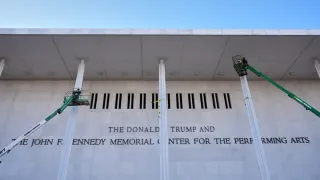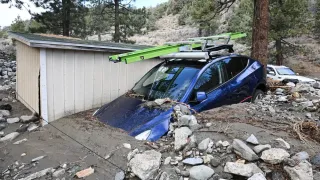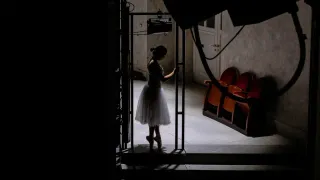February 5, 2024
Compromised Spaces: Sundance 2024
C.J. Prince READ TIME: 10 MIN.
On January 22, several days into the Sundance Film Festival's 40th edition, attendees in Park City, Utah filled up the Eccles Theatre to watch the premiere of "Will and Harper," a documentary about Will Ferrell going on a road trip with his close friend Harper Steele, who recently came out as a transgender woman. The screening was a typical Sundance success story: standing ovations, positive reviews, and eventually news of the film being purchased by Netflix. On January 30, eight days after "Will and Harper" premiered, Utah's Republican Gov. Spencer Cox signed HB 257, a bill that bans transgender individuals from using bathrooms in schools and government buildings that align with who they are, into law. At the time of this writing, the Sundance Film Festival, while issuing statements supporting inclusivity and transgender artists, has yet to acknowledge HB 257 outside of general references to anti-trans legislation across America.
The disparity between the warm reception Sundance offers queer artists and subjects, and the harsh reality for transgender students in the festival's host state speaks to an ongoing, paradoxical quality of film festivals that's gotten more pronounced in recent years: how to reconcile the progressive aims of a film festival with the politics of running one. And while Sundance had a strong presence of queer filmmakers and subject matter this year, from Theda Hammell's "Stress Positions" and Jane Schoenbrun's "I Saw the TV Glow," to Esteban Arango's and River Gallo's "Ponyboi," or Jules Roskam's "Desire Lines," it's telling that, as an organization, Sundance won't take any action outside of its own privileged ecosystem. It might have to do with another piece of news floating around in Park City; the festival, which gets support from Utah's state government, will begin negotiations that could result in Sundance relocating to a different state. It must be difficult to speak truth to the hand that feeds.
These developments aren't new. In The Daily Beast's report on how HB 257 impacted this year's festival, it's pointed out that anti-trans legislation has been passed in Utah over the last several years. So what purpose does Sundance have as a self-described "champion" of "independent stories" if they're unwilling to take a stand for the very people they'll gladly platform to boost themselves? The festival, as well as the Sundance Institute that runs it, can have it both ways, while the marginalized people they showcase don't have that luxury, as the chance to play at Sundance can make for a life-changing opportunity that's difficult to hold a principled stance against. Sundance claims it supports queer artists, although the nature of its current form forces artists to compromise themselves in order to participate.
Ironically, two of the strongest films I saw from this year's programme focused on individuals with the kind of backbone their multi-million dollar organization lacks. Stephen Maing and Brett Story's documentary "Union" details the struggles of the Amazon Labor Union (ALU), a group headed by former Amazon employee Chris Smalls, as they strategize and campaign to establish a union at one of the multi-billion-dollar corporation's warehouses (Smalls was fired by Amazon in 2020 after he walked out due to unsafe conditions that put workers at risk of contracting COVID-19). Maing and Story use a direct approach, filming Smalls and other ALU members as they navigate Amazon's intimidation tactics to discourage their workers from supporting a union, as well as internal dissent within ALU and an apathetic response from national labor unions. There are times when "Union" struggles to find a middle ground between covering the nuances of forming a union and creating an accessible David vs Goliath type of narrative that can encourage people to consider unionizing their workplace. But Maing and Story never keep their eyes off of the bigger picture, and while they acknowledge how compelling of a figure Smalls can be, they rightfully veer away from an individual portrait to emphasize the uphill battle of protecting labor rights in America.
In the World Cinema Documentary Competition, "Black Box Diaries" chronicles the saga of Japanese journalist and director Shiori Ito, who accuses reporter Noriyuki Yamaguchi of sexually assaulting her in 2015. Ito's attempts to report the crime to police fall on deaf ears at first, until the investigation gets called off altogether (Yamaguchi was friends with former Prime Minister Shinzo Abe, and it's implied that this connection may have had a hand in why the investigation stopped). Ito goes public in 2017, instead pursuing justice via a civil court case, which in turn labels her as a #MeToo figure for Japan and sparks a debate around Japan's archaic criminal code for sex crimes. With Ito directing the documentary herself, "Black Box Diaries" allows for a level of closeness with its subject that a different director couldn't achieve. The film oscillates between riveting procedural and something more diaristic, as Ito faces mounting isolation and retaliation for her pursuit of justice, while her recorded interactions with various authority figures provide disturbing glimpses into the level of corruption she's up against (the worst example being when an investigative officer who worked on Ito's case drunkenly hits on her while she seeks his permission to include him in her memoir). By the time Ito decides to end her film after a seven-year journey, the small bit of closure she receives in the form of a verdict for her civil suit feels like a long sigh of relief after watching her endure so much.






